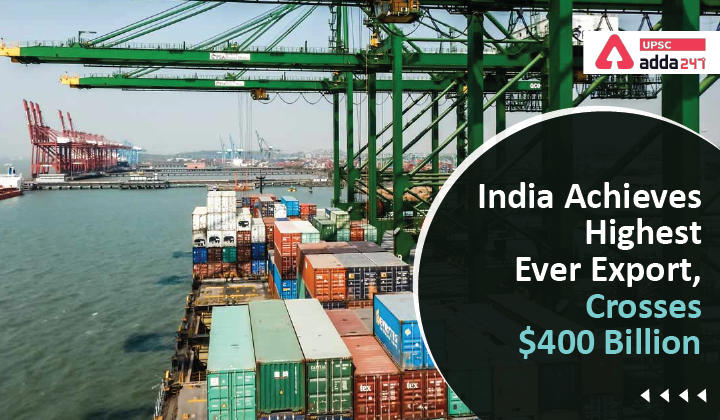Table of Contents
Export sector in India: Relevance
- GS 3: Indian Economy and issues relating to planning, mobilization, of resources, growth, development and employment.
Export growth in India: Context
- According to the recently released data from Ministry of Commerce and Industry, India’s exports for the first time crossed the USD 400 billion mark in a fiscal year.
Export from India: Key points
- The merchandise exports rose by 37% to USD 400.8 billion in 2021-22 until March 21 against USD 292 billion in 2020-21.
- In 2018-19, exports touched a record of USD 330.07 billion, which was highest until now.
- Imports during the period stood at USD 589 billion, leaving a trade deficit of about USD 189 billion.
- Major performers: Good performance of petroleum products, engineering, gems and jewellery, and chemicals.
- Going by the trend, it is expected that USD 10-12 billion will be added in the remaining nine days, taking the exports by end of 2021-22 to over USD 410 billion.
- Engineering goods exports have gone up by nearly 50 per cent so far this fiscal as compared to the last year.
- Agriculture exports too have recorded the highest ever export in 2021-22 due to export of “rice, marine products, wheat, spices and sugar.
Export crosses 400 billion mark: Significance
- The highest ever goods export target was achieved nine days ahead of the March 31 deadline.
- This comes at a time when India is facing adversities including Covid-19 pandemic, and Russia-Ukraine war.
- It is a remarkable achievement as exporters have added over USD 110 billion in one year to reach here despite huge logistics challenges, including container shortage, skyrocketing freight and liquidity constraints.
- India crossing USD 400 billion merchandise exports marks the beginning of an era of exponential growth and dominance in world trade.
- Higher engineering exports, apparel and garment export, etc. indicate that the misconception of India being a major exporter of primary commodities is gradually changing.
- The boost in the exports is likely to bolster India’s position in the ongoing negotiations for Free Trade Agreements (FTAs) with several trade partners.
Why India should focus on export?
- Creates a virtuous cycle of employment, income growth, and demand-led industrial growth: as the export will drive domestic manufacturing-led employment and per-capita income. This will increase disposable income resulting in demand-driven economic growth.
- Export and economic growth:
- Pre-1991, a 3.5% growth rate was associated with export growth of about 4.5%.
- However, India’s GDP growth of over 6% after 1991 was associated with real export growth of about 11%.
- Improved sovereign credit rating: Export growth will help in reducing India’s trade deficit, nudging credit rating agencies to improve India’s credit rating resulting in lower interest loans and economic growth.
Challenges of Indian Export ecosystem
- Government’s focus on domestic consumption-led growth model:
- Poor growth in per capita income: will limit the consumption of goods and services.
- COVID-19 effect: resulted in poor public spending, tax cuts, private investment, etc., limiting the scope for domestic demand-led growth.
- Disconnect with Global Value Supply Chains (GVC): Unlike major exporting countries of east and south-east Asia, India is poorly connected with GVCs. This limits its export potential.
- This results in low penetration in high-income countries.
- Focus on limited export destination: This results in high competition and fewer growth opportunities.
- Poor domestic infrastructure and clear policy direction: for example, India spends more than 14% of its GDP on logistics, resulting in costlier products for international markets, diminishing their competitiveness.
- Lack of awareness: There is an information gap among people of India, resulting in fewer people participating in the export market.
- Technical barriers to trade: Imposed by many developed countries to reject exports from India. For example, use of sanitary and phytosanitary measures by European Union countries to rejects various Indian goods.





 TSPSC Group 1 Question Paper 2024, Downl...
TSPSC Group 1 Question Paper 2024, Downl...
 TSPSC Group 1 Answer key 2024 Out, Downl...
TSPSC Group 1 Answer key 2024 Out, Downl...
 UPSC Prelims 2024 Question Paper, Downlo...
UPSC Prelims 2024 Question Paper, Downlo...
